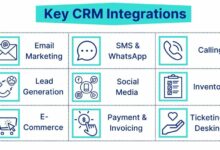Crm data migration services: 7 Powerful CRM Data Migration Services for 2024
Switching CRM platforms? Don’t risk your data. Discover the top CRM data migration services that ensure a smooth, secure, and scalable transition—without losing a single lead.
What Are CRM Data Migration Services?

CRM data migration services are specialized solutions designed to transfer customer relationship management (CRM) data from one system to another with minimal disruption, data loss, or corruption. As businesses grow and evolve, they often outgrow their current CRM platforms or seek more advanced features, prompting the need for a system upgrade or switch. However, moving vast amounts of customer data—such as contact details, sales history, communication logs, and lead pipelines—requires precision, technical expertise, and strategic planning.
These services go beyond simple data copying. They involve data extraction, cleansing, transformation, mapping, validation, and integration into the new CRM environment. Whether migrating from legacy systems like Microsoft Dynamics or Salesforce to modern platforms like HubSpot or Zoho, CRM data migration services ensure that data integrity is preserved and compliance standards are met.
Why Businesses Need Professional CRM Migration
Attempting a DIY CRM migration might seem cost-effective, but it often leads to data duplication, formatting errors, and even complete data loss. Professional CRM data migration services reduce risks by employing experienced data architects and migration specialists who understand the nuances of different CRM ecosystems.
- Minimize downtime during transition
- Ensure data accuracy and consistency
- Preserve historical customer interactions
- Maintain compliance with GDPR, CCPA, and other regulations
According to a Gartner report, over 60% of mid-sized companies changed their CRM platforms between 2021 and 2023, with data migration being the top challenge cited.
Key Components of CRM Data Migration
A successful CRM data migration isn’t just about moving data—it’s about transforming it into a usable, structured format within the new system. The process typically includes several core stages:
Data Extraction: Pulling data from the source CRM, including databases, spreadsheets, and third-party integrations.Data Cleansing: Removing duplicates, correcting formatting issues, and validating email addresses and phone numbers.Data Mapping: Aligning fields from the old CRM to the new one (e.g., “Lead Source” in Salesforce to “Origin” in HubSpot).Transformation: Converting data types, currencies, date formats, and custom fields to match the target system.Validation & Testing: Running test migrations to verify accuracy before full deployment.”Data is only as valuable as its accuracy and accessibility.A poorly executed CRM migration can cost companies up to 20% of their annual sales productivity.” — CRM Industry Analyst, Forrester ResearchTop 7 CRM Data Migration Services in 2024With a growing number of providers offering CRM data migration services, choosing the right one can be overwhelming..
Below is a curated list of the top seven services based on reliability, scalability, customer support, and integration capabilities.These providers specialize in seamless transitions across major CRM platforms, ensuring your business data remains intact and actionable..
1. Astera Centerprise
Astera Centerprise is a powerful data integration platform that offers robust CRM data migration services. It supports over 40 data sources and targets, including Salesforce, Microsoft Dynamics, HubSpot, and Zoho CRM. Its drag-and-drop interface makes it accessible for non-technical users, while advanced scripting options cater to enterprise-level needs.
Key features include automated data cleansing, real-time migration monitoring, and built-in compliance tools for data privacy regulations. Astera also provides pre-built migration templates, reducing setup time by up to 70%.
- Supports cloud-to-cloud, on-premise-to-cloud, and hybrid migrations
- Offers end-to-end encryption for secure data transfer
- Includes AI-powered data matching to prevent duplicates
Learn more at astera.com.
2. Talend Data Integration
Talend is a leader in enterprise data integration and offers comprehensive CRM data migration services through its cloud-based platform. It excels in handling large-scale migrations with high data fidelity and performance. Talend’s open-source roots give it flexibility, while its cloud-native architecture ensures scalability.
The platform uses machine learning to auto-detect data patterns and suggest optimal field mappings. It also integrates with popular ETL (Extract, Transform, Load) workflows, making it ideal for companies already using data warehouses or BI tools.
- Real-time data validation and error logging
- Seamless integration with Salesforce, Oracle CRM, and SAP
- Comprehensive audit trails for compliance reporting
Explore Talend’s CRM migration tools at talend.com.
3. MuleSoft Anypoint Platform
MuleSoft, a Salesforce company, offers one of the most sophisticated CRM data migration services through its Anypoint Platform. It specializes in API-led connectivity, enabling smooth data flow between disparate systems. This makes it especially effective for organizations with complex IT landscapes.
MuleSoft doesn’t just migrate data—it creates reusable integration assets that can be leveraged across departments. Its visual design interface allows teams to map data flows without writing code, while developers can extend functionality using Java or JavaScript.
- Enables real-time synchronization post-migration
- Supports bidirectional data transfer
- Provides governance and security controls
Visit mulesoft.com for migration solutions.
4. Informatica Intelligent Data Management Cloud (IDMC)
Informatica IDMC is a cloud-native platform that delivers intelligent, automated CRM data migration services. It uses AI and metadata intelligence to streamline the entire migration lifecycle. Informatica is trusted by Fortune 500 companies for its reliability and compliance capabilities.
The platform automatically discovers data sources, assesses data quality, and recommends cleansing actions. It also supports master data management (MDM), ensuring consistency across multiple systems after migration.
- AI-driven data profiling and anomaly detection
- End-to-end encryption and role-based access control
- Pre-built connectors for major CRMs and ERP systems
Discover more at informatica.com.
5. Dell Boomi
Dell Boomi is a low-code integration platform that offers fast and efficient CRM data migration services. Known for its speed and ease of use, Boomi enables businesses to complete migrations in days rather than weeks. Its AtomSphere platform supports cloud, on-premise, and hybrid environments.
Boomi’s strength lies in its extensive library of pre-built connectors and workflows. It also offers real-time monitoring dashboards, allowing IT teams to track migration progress and resolve issues instantly.
- Drag-and-drop workflow designer
- Automated error handling and retry mechanisms
- Supports bulk and incremental data transfers
Check out Boomi’s migration capabilities at boomi.com.
6. FME by Safe Software
FME (Feature Manipulation Engine) is a spatial and enterprise data integration platform that supports CRM data migration services with a focus on precision and flexibility. While often used in GIS applications, FME’s robust transformation engine makes it ideal for complex CRM data structures.
It supports over 450 data formats and can handle custom objects, nested JSON, and hierarchical data models. FME is particularly useful when migrating from legacy or proprietary CRM systems with non-standard data schemas.
- Advanced data transformation and scripting tools
- Visual debugging and data preview features
- Supports batch and real-time migration modes
Learn more at safe.com.
7. Highbrow Consulting
Highbrow Consulting is a boutique CRM migration firm specializing in Salesforce and HubSpot implementations. Unlike large platforms, Highbrow offers personalized CRM data migration services tailored to small and mid-sized businesses. Their hands-on approach includes strategy consulting, data auditing, and post-migration training.
They use a proprietary migration framework called “DataShift,” which combines automation with human oversight to ensure high data quality. Clients praise their responsive support and clear communication throughout the migration process.
- Full-service migration from assessment to go-live
- Custom scripting for unique business logic
- Post-migration optimization and cleanup
Visit highbrowconsulting.com for details.
How to Choose the Right CRM Data Migration Service
Selecting the right CRM data migration service is critical to the success of your CRM transition. With so many options available, it’s essential to evaluate providers based on your specific business needs, technical infrastructure, and long-term goals. The wrong choice can lead to costly delays, data inconsistencies, and user dissatisfaction.
Consider the following criteria when comparing CRM data migration services to ensure you make an informed decision.
Data Security and Compliance
Data security should be your top priority. CRM systems contain sensitive customer information, including personal identifiers, financial data, and communication history. Ensure the migration service uses end-to-end encryption, secure authentication protocols, and complies with regulations like GDPR, HIPAA, or CCPA.
- Ask for SOC 2 or ISO 27001 certification
- Verify data residency policies (where your data is stored)
- Ensure they offer data anonymization for testing environments
A breach during migration can damage your brand reputation and result in legal penalties.
Integration Capabilities
Your CRM doesn’t operate in isolation. It connects with email marketing tools, ERP systems, customer support platforms, and analytics dashboards. The migration service must support seamless integration with these systems—both during and after the migration.
- Check for pre-built connectors to your existing tools
- Ensure API compatibility with your tech stack
- Ask about post-migration sync options
For example, if you use Mailchimp for email campaigns and QuickBooks for accounting, your CRM migration should preserve these links without requiring manual reconfiguration.
Scalability and Performance
As your business grows, so will your data volume. The chosen CRM data migration service must handle large datasets efficiently and scale with your needs. Look for platforms that offer incremental migration, parallel processing, and cloud elasticity.
- Test migration speed with a sample dataset
- Ask about maximum data volume limits
- Ensure the platform can handle peak loads without downtime
Performance benchmarks matter—especially for enterprises with millions of records.
Common Challenges in CRM Data Migration
Even with professional CRM data migration services, organizations often face hurdles that can derail the process. Understanding these challenges in advance allows you to plan mitigation strategies and set realistic expectations.
Data Quality Issues
Poor data quality is the number one obstacle in CRM migrations. Inconsistent formatting, missing fields, duplicate entries, and outdated information can corrupt the migration process. A study by Experian found that 66% of businesses report poor data quality as a major barrier to digital transformation.
To combat this, many CRM data migration services include data profiling tools that scan your source data and generate quality reports. These reports highlight issues like invalid email addresses, incomplete phone numbers, or mismatched address formats.
- Run a data audit before migration begins
- Standardize naming conventions and field formats
- Use deduplication tools to merge duplicate contacts
“You can’t migrate bad data into a new system and expect good results. Data cleansing is not optional—it’s essential.” — Data Governance Expert, IBM
Field Mapping Complexity
Every CRM system structures data differently. What one platform calls “Opportunity Stage,” another may label “Sales Pipeline Status.” Field mapping requires careful alignment to ensure data lands in the correct destination fields.
Automated mapping tools help, but they’re not foolproof. Complex custom fields, picklists, and multi-select options often require manual intervention. Misaligned fields can lead to lost information or incorrect reporting.
- Create a detailed field mapping document
- Involve CRM administrators and sales teams in validation
- Test mappings with a small dataset first
Downtime and Business Disruption
Downtime during CRM migration can halt sales operations, delay customer support, and frustrate employees. While some downtime is inevitable, the best CRM data migration services minimize it through phased rollouts and parallel system runs.
- Plan migration during low-activity periods (e.g., weekends)
- Use incremental migration to transfer data in batches
- Keep the old system accessible during transition
Communicate the migration schedule clearly to all stakeholders to reduce anxiety and confusion.
Best Practices for a Successful CRM Migration
A successful CRM migration isn’t just about technology—it’s about people, processes, and planning. Following industry best practices can significantly increase your chances of a smooth transition.
Start with a Clear Strategy
Before selecting a CRM data migration service, define your migration goals. Are you upgrading for better analytics? Improving user experience? Consolidating multiple CRMs? A clear strategy guides every decision, from vendor selection to timeline planning.
- Identify key stakeholders (sales, marketing, IT)
- Document current pain points with the existing CRM
- Define success metrics (e.g., data accuracy rate, user adoption)
Engage a project manager to oversee the migration and maintain accountability.
Conduct a Data Audit
Not all data needs to be migrated. Legacy systems often accumulate outdated, irrelevant, or redundant information. Conducting a data audit helps you identify what to keep, archive, or delete.
- Classify data by age, relevance, and usage frequency
- Remove test records, spam leads, and inactive accounts
- Archive historical data that’s no longer active but may be needed for compliance
This reduces migration time, lowers costs, and improves system performance.
Test Thoroughly Before Go-Live
Never skip the testing phase. Run multiple test migrations using a sandbox environment to verify data accuracy, field mappings, and workflow functionality.
- Validate critical data points (e.g., deal values, contact ownership)
- Check integration points with other systems
- Involve end-users in user acceptance testing (UAT)
Fix any issues before the final migration to avoid post-launch crises.
The Role of Automation in CRM Data Migration Services
Automation is revolutionizing CRM data migration services by reducing manual effort, minimizing errors, and accelerating timelines. Modern platforms leverage AI, machine learning, and robotic process automation (RPA) to handle repetitive tasks with precision.
Automated tools can extract data, detect anomalies, suggest field mappings, and even generate migration reports. This allows human experts to focus on strategic decisions rather than data entry.
AI-Powered Data Cleansing
Artificial intelligence can analyze data patterns and automatically correct inconsistencies. For example, AI can standardize phone number formats, detect and merge duplicate records, or flag incomplete entries for review.
- Reduces manual data scrubbing time by up to 80%
- Improves data accuracy and completeness
- Learns from past migrations to enhance future performance
Platforms like Informatica and Talend use AI to provide real-time data quality scores.
Automated Field Mapping
One of the most time-consuming aspects of CRM migration is mapping fields between systems. Automated mapping tools use natural language processing (NLP) to match similar field names and suggest optimal mappings.
- Speeds up the setup process
- Reduces human error in field alignment
- Supports custom logic for complex transformations
However, always review automated suggestions—especially for mission-critical fields like revenue or contract dates.
Robotic Process Automation (RPA)
RPA bots can simulate human actions to migrate data from legacy systems that lack APIs. This is particularly useful for older CRMs or custom-built applications.
- Enables migration from non-digital or semi-digital sources
- Operates 24/7 without fatigue
- Integrates with modern CRM platforms via UI automation
While RPA is powerful, it should be used cautiously and monitored closely to prevent data corruption.
Future Trends in CRM Data Migration Services
The landscape of CRM data migration services is evolving rapidly, driven by advancements in cloud computing, artificial intelligence, and data governance. Staying ahead of these trends ensures your business remains agile and data-driven.
Real-Time Migration and Sync
Future CRM data migration services will move beyond one-time transfers to offer continuous, real-time synchronization. This allows businesses to run parallel systems during transition and switch seamlessly when ready.
- Enables zero-downtime migrations
- Supports hybrid CRM environments
- Facilitates ongoing data integration across platforms
Tools like MuleSoft and Boomi are already leading this shift.
Increased Use of AI and Predictive Analytics
AI will play a larger role in predicting migration risks, optimizing data flows, and enhancing post-migration analytics. Predictive models can forecast data quality issues before they occur and recommend corrective actions.
- AI-driven migration health dashboards
- Predictive field mapping suggestions
- Automated compliance checks based on regional laws
These capabilities will make CRM migrations faster, safer, and more intelligent.
Focus on Data Privacy and Ethical AI
As data privacy regulations tighten, CRM data migration services must prioritize ethical data handling. This includes transparent consent management, data minimization, and explainable AI algorithms.
- Ensure GDPR-compliant data transfer mechanisms
- Implement data anonymization for testing
- Provide audit logs for all migration activities
Trust will become a key differentiator among service providers.
What are CRM data migration services?
CRM data migration services are professional solutions that help businesses transfer customer data from one CRM system to another securely and accurately. They include data extraction, cleansing, mapping, transformation, and validation to ensure a smooth transition without data loss.
How long does a CRM data migration take?
The duration varies based on data volume and complexity. Small migrations can take a few days, while enterprise-level projects may require several weeks. Using automated CRM data migration services can reduce time by up to 50%.
Can I migrate data from a legacy CRM system?
Yes, most CRM data migration services support legacy systems, including custom-built or outdated platforms. They use ETL tools, APIs, or RPA to extract and transform data into modern CRM formats.
Is it safe to migrate CRM data to the cloud?
Yes, when using reputable CRM data migration services with strong encryption, compliance certifications, and secure transfer protocols. Always verify the provider’s security standards before starting the migration.
Do I need to clean my data before migration?
While many CRM data migration services include data cleansing, it’s best to audit and clean your data beforehand. Removing duplicates and outdated records improves accuracy and reduces migration time and costs.
CRM data migration services are essential for businesses transitioning between customer relationship management platforms. From data extraction and cleansing to field mapping and validation, these services ensure data integrity, minimize downtime, and support compliance. Leading providers like Astera, Talend, MuleSoft, and Informatica offer powerful tools powered by automation and AI. By following best practices—such as conducting data audits, testing thoroughly, and choosing secure, scalable solutions—organizations can achieve a seamless migration. As technology evolves, real-time sync, predictive analytics, and ethical AI will shape the future of CRM data migration, making it faster, smarter, and more secure than ever.
Further Reading:



